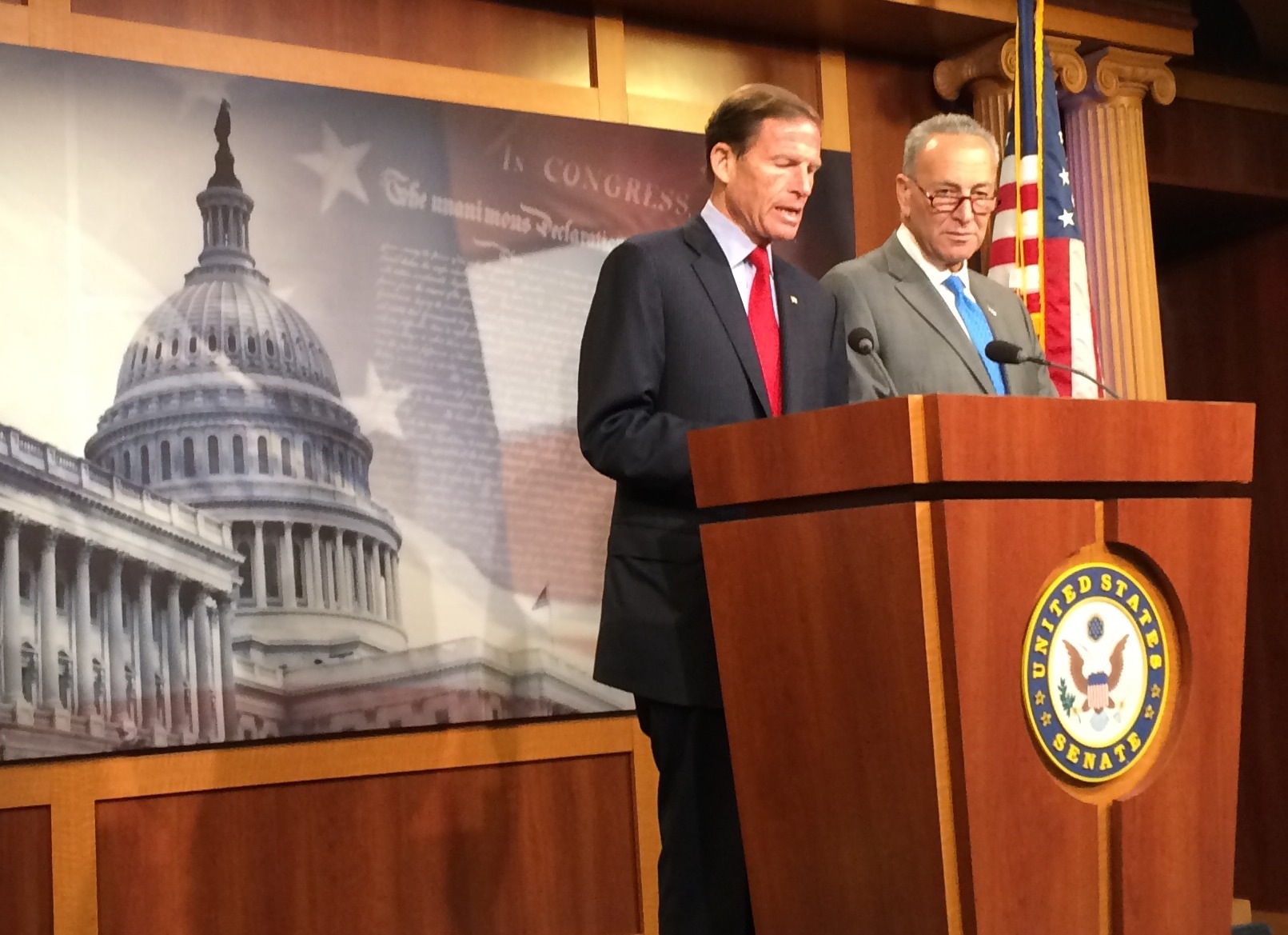Connecting state and local government leaders
U.S. Sens. Blumenthal and Schumer co-sponsor legislation to expand the bankruptcy code for the commonwealth.
WASHINGTON — Filing for bankruptcy would become an option for public utilities and other municipal entities in Puerto Rico under a bill U.S. Sens. Richard Blumenthal and Charles Schumer introduced on Wednesday.
But how far the legislation would go toward addressing the massive public debt crisis that is unfolding on the island remains unclear. As do the odds that the bill can garner enough Republican support to win approval in Congress. Critics have derided the idea of expanding Chapter 9 of the U.S. Bankruptcy Code to include Puerto Rico, calling the move a “bailout.”
Blumenthal sees it differently.
“Essentially, the purpose of this bill is to avoid disaster. To prevent Puerto Rico from going over a fiscal cliff that is entirely preventable,” he said during a press conference at the Capitol on Wednesday, where he announced that he would sponsor the legislation.
The Connecticut senator is a Democrat, as is Schumer, who represents New York.

Chapter 9 of the bankruptcy code allows municipal entities, such as cities, counties, utilities and school districts, to file for bankruptcy if they can show that they are insolvent. It currently does not cover entities in Puerto Rico, which is what the new Senate bill seeks to change. While Chapter 9 filings tend to be rare, there have been some high profile cases in recent years involving cities such as Detroit, San Bernardino and Stockton, as well as other jurisdictions around the U.S.
Asked after the news conference whether any municipal corporations, or utilities in Puerto Rico had indicated to him directly that they are interested in filing for Chapter 9, Blumenthal said: “I haven’t heard it directly, but the governor has told me that they are.”
Puerto Rico’s governor, García Padilla, called for changes to the Chapter 9 bankruptcy code during a June 29 address about the commonwealth’s fiscal condition.
According to a copy of his remarks, he said during that address: “Our public debt, considering the current level of economic activity, is unpayable.”
Who Issued the Debt?
As it stands, Puerto Rico has approximately $73 billion of debt, spread across the central government and a number of other public entities. Included among these entities is the Puerto Rico Electric Power Authority, which is often called PREPA, the Highways & Transportation Authority, and the Aqueduct and Sewer Authority.
U.S. states are not eligible to file for Chapter 9 protection, and under the proposal from Blumenthal and Schumer, the same would be true for Puerto Rico’s central government.
“Puerto Rico itself would not be authorized to file for bankruptcy,” Blumenthal stressed as he discussed the bill with reporters. But he said that the legislation would open the door for possible filings by the electric, highway and transportation, and aqueduct and sewer authorities.
Last week, Moody’s Investors Service released a breakdown of $63.8 billion of Puerto Rico’s public debt that it had rated.
Based on those figures, the three authorities Blumenthal mentioned have a combined total of more than $16 billion of debt. About $9 billion belongs to the electric power authority $4.4 billion to the highway and transportation authority, and $3.3 billion to the sewer authority.
Another $18.5 billion of the debt rated by Moody’s was general obligation bonds guaranteed by the central government. This general obligation debt would almost certainly not fall under the provisions of the Chapter 9 code. Among the other significant outstanding obligations on the Moody’s list is roughly $15.2 billion of sales tax revenue bonds, also known as Confina bonds, a reference to the Spanish acronym for Puerto Rico’s Sales Tax Financing Corporation.
Questions About Insolvency
Government entities seeking to file for bankruptcy can face a difficult hurdle when trying to prove they are insolvent, according to a report Moody’s issued on the topic in 2012. Insolvency means a municipality is unable to pay debts as they become due. The authors of the report pointed to past filings involving Boise County, Idaho, in 2011 and Bridgeport, Connecticut, in 1991, which courts tossed out after deeming that the municipalities were not truly insolvent.
OppenheimerFunds Inc., is one of the largest U.S. holders of Puerto Rico debt. A summary of a July 6 conference call with Oppenheimer executives specifically notes that, in the company’s view, the Cofina sales tax revenue bonds would “have a tough time proving insolvency,” and that the same goes for the aqueduct and sewer authority.
In terms of their fiscal health, the authorities vary. Ted Chapman, a senior analyst who tracks Puerto Rico’s public utilities for Standard & Poor's, noted in an interview earlier this week that the electric authority, in particular, is in a tough financial spot.
“I think it’s pretty self evident that they’ve got cash flow and cash reserve problems, there was uncertainty up until the 11th hour as to whether they would’ve been able to make their July 1, the most recent, debt service payment,” he said. “They did, but it wasn’t certain until the very end.”
“The water and sewer authority does not share the same cash reserve and cash flow problems,” he added. What remains to be seen, he said, is whether the authorities’ cash might be called on to help alleviate some of the other financial emergencies the commonwealth is experiencing.
Chapman was not aware of any public statements from the utilities, or other government entities in Puerto Rico, saying that they would file for Chapter 9 protection if the option becomes available.
A Bailout?
Puerto Rico's non-voting congressional representative, Resident Commissioner Pedro Pierluisi, put forward legislation in the U.S. House earlier this year that is similar to the bill Blumenthal and Schumer unveiled on Wednesday. Republican leaders on the House Judiciary Committee were cool toward Pierluisi’s bill.
Asked twice by email whether Sen. Charles Grassley, the Iowa Republican who chairs his chamber's Judiciary Committee, would support the bill, Grassley spokeswoman Beth Levine did not respond directly, but she did say: “At this time, there is no clear path forward.”
“What is clear, though, is that bankruptcy alone isn't going to solve all of the financial problems Puerto Rico has gotten itself into,” Levine added. “Chairman Grassley has indicated that it's going to be important for Puerto Rico to have a plan to address all of its underlying financial problems.”
Called “The Puerto Rico Chapter 9 Uniformity Act,” the legislation Blumenthal and Schumer introduced currently has 10 other co-sponsors. They’re all Democrats, except for Bernie Sanders, an Independent from Vermont, who is also currently campaigning for the 2016 Democratic presidential nomination.
At the press conference on Wednesday Schumer said that he’d talked to “five or six” Republicans who were “studying” the bill. “They seem to be genuinely interested,” he said.
Blumenthal highlighted the fact that he’d had an “encouraging” conversation with a Republican colleague about the legislation on Wednesday morning. “I think they are, really, very understandably, concerned about some of the misconceptions,” he said. “Like, that this would be a bailout. Not true. That federal money would be involved. Not true.”
“This is really a fairly technical, modest change,” he added.
Even if the bill is enacted, how far it would go to address the financial problems in Puerto Rico is an open question.
During the interview earlier this week, Chapman, at Standard & Poor’s, referred to a report issued at the end of June looking at the commonwealth’s fiscal situation. It was authored by a team of economists that included Anne O. Krueger, a former top official for the International Monetary Fund. He said that the report made it clear that when it comes to the challenges in Puerto Rico, “there’s not just one kind of magic bullet to fix it.”
Referring to the report’s authors, Chapman added: “How you would go about talking to the various, different creditors, and people who just have skin in the game, I think they very candidly said it’s not going to be easy to reach any kind of solution.”
Bill Lucia is a Reporter for Government Executive’s Route Fifty.

NEXT STORY: Gridlocked Illinois Stops Paying State Salaries; ‘Wealth Adjacent’ Big City Is Just Plain Poor




